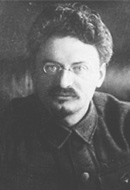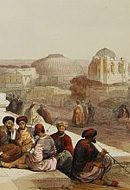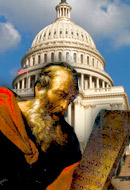History
 Hear, O Friends of Israel
Hear, O Friends of IsraelThursday, February 2, 2012 by Daniel Johnson | Jewish Ideas Daily » Daily Features
In 1987, exactly a quarter-century ago, the appearance of a work of Jewish history caused a stir. For one thing, the author was not Jewish; for another, the book was unashamedly supportive of the State of Israel, which even then was enough to provoke hostility, especially on the Left.
 Bloomsbury’s Rabbi
Bloomsbury’s RabbiTuesday, January 31, 2012 by Matthew Ackerman | Jewish Ideas Daily » Daily Features
A translator stands between two languages and between the two worlds that the languages represent. If he does his job well, he may belong in neither place. Such was the fate of Samuel Koteliansky, an emigré Russian Jew who translated Chekhov, befriended D.H. Lawrence and Katherine Mansfield, and circulated on the fringes of the Bloomsbury group.
 Rematch!
Rematch!Monday, January 30, 2012 by Elliot Jager | Jewish Ideas Daily » Daily Features
London—Europe's biggest city, with 5.8 million eligible voters—goes to the polls on May 3rd to elect a mayor. Like any big city mayoral campaign, the contest will revolve mainly around local issues. But the race also has the potential to return a vitriolic anti-Zionist to City Hall.
 Whose Holocaust?
Whose Holocaust?Friday, January 27, 2012 by Margot Lurie | Jewish Ideas Daily » Daily Features
For much of Europe, today is the UN-designated International Holocaust Remembrance Day. Secretary-General Ban Ki-moon has dedicated his address this year to children murdered by the Nazis, with the message that "the best tribute to the memory of these children is an ongoing effort to teach the universal lessons of the Holocaust, so that no such horror is visited upon future generations."
 Listening to Saddam
Listening to SaddamThursday, January 26, 2012 by Alex Joffe | Jewish Ideas Daily » Daily Features
In the debate over Iran's nuclear intentions, the question of rationality looms menacingly. How do Iran's rulers perceive cause and effect, calculate costs and benefits, and make policy decisions in order to maximize the well-being of their state and citizens? How do they understand the outside world?
 Trotsky Eats and Runs
Trotsky Eats and RunsWednesday, January 25, 2012 by Micah D. Halpern | Jewish Ideas Daily » Daily Features
I first heard the name Trotsky when I was seven years old. My grandfather, a Jewish tailor from Belarus who arrived in the goldene medine and pulled himself up by his bootstraps to own a men's suit factory in New York, had just gotten a swept-back haircut. He called it a Trotsky.
 Whither the Alawites
Whither the AlawitesFriday, January 20, 2012 by Elliot Jager | Jewish Ideas Daily » Daily Features
Time does not appear to be on the side of Syria's minority Alawite-led regime. President Bashar Assad has reportedly been offered asylum in Moscow, which wants an orderly transition that will preserve Russian strategic interests. Other stories have Assad and his loyalists preparing mountain strongholds for a last-ditch stand.
 Jerusalem’s Ego and Id
Jerusalem’s Ego and IdThursday, January 19, 2012 by Alex Joffe | Jewish Ideas Daily » Daily Features
Biography is not the same as history. Biography charts the outer and inner life of a person—character, spirit, morality, emotion, perhaps even soul. History, by contrast, incorporates different narratives and pieces of evidence, seeks out new data, then rises above all the fragments with a synthesis.
 America the Biblical
America the BiblicalTuesday, January 17, 2012 by Diana Muir Appelbaum | Jewish Ideas Daily » Daily Features
The Greeks did not invent equality. Socrates, Aristotle, Plato, and the gang famously believed that the rich are different from you and me—not merely because they are shaped by their privileges but because they are actually, literally made of superior stuff.
 Gender Trouble
Gender TroubleMonday, January 16, 2012 by Yehudah Mirsky | Jewish Ideas Daily » Daily Features
Suddenly, it seems, gender segregation is everywhere in Israel—buses, army bases, Jerusalem sidewalks, Beit Shemesh schoolyards and, above all, the front pages. What is going on here? Why is all this happening now? Let's begin with the second question.
Editors' Picks
A Heretic in the Truth Zachary Micah Gartenberg, Jewish Review of Books. Spinoza takes Maimonides' characterization of miracles as divinely implanted—but still natural—anomalies in the regular course of things. Then Spinoza adds a twist.
Masonic Rites in the Holy Land Nadav Shragai, Israel Hayom. Below Jerusalem's Old City, a Freemason "laid my pocket Bible atop the stone in the middle of the cave and three candles around it which shower light . . ."
The Spirit is Unwilling Mary Pilon, New York Times. Why won't the president of the International Olympic Committee allow for a moment of silence, in "the Olympic spirit," on the tragic anniversary of the 1972 murder of 11 Israeli athletes and coaches?
Doctor Who? Roni Caryn Rabin, New York Times. Despite a sequence of papal edicts prohibiting Jewish doctors from treating Christians, almost every pope in history had a personal physician who was Jewish.
The Nakba that Almost Was Robert Werdine, Times of Israel. What would have happened to the Jewish towns of nascent Israel were the invading Arab armies successful?
Dragoman Eric Ormsby, Wall Street Journal. Though Bernard Lewis is firmly opposed to historical relativists, he is keenly aware of the sheer slipperiness of historical terrain.
Wadiya Doin'? J. Hoberman, Tablet. Chaplin's Great Dictator ends with an anti-fascist speech; Sacha Baron Cohen's Dictator breaks the proscenium to make a blunt political statement—about the inequities of American society.
The Refugee Question Ruth Lapidoth, Jerusalem Center for Public Affairs. The plight of the Palestinian refugees raises at least three legal questions: Who is considered a refugee? Do these refugees have a right to return to Israel? Do they have a right to compensation? (2002)
Body Language Arika Okrent, Lapham's Quarterly. Jews tended to use one hand, Italians both. Italians touched their own bodies, Jews touched the bodies of their conversational partners. But as Jews and Italians became American, so did their gestures.
Campaign for Relegitimization Joel Fishman, Israel Council on Foreign Relations. It is no longer enough for Israel to proclaim that it seeks peace. Although it is unfashionable to speak in such terms, we are also engaged in a religious war. (PDF)

